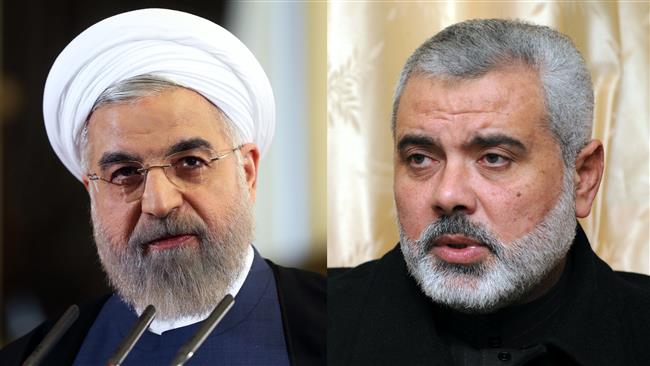Rouhani: “Oppressed people of Palestine and the Islamic community will resist against this American-Zionist conspiracy with unity”
LATEST
- Prominent Iranian MP Rejects Freeing of Political Prisoner Zaghari-Ratcliffe
- Government Budget Cuts Investment in Infrastructure
TUESDAY FEATURE
Podcast: Will Iran Release Political Prisoner Zaghari-Ratcliffe?
Seeking to rally opinion around its position, Iran pursued a rhetorical campaign on multiple fronts on Monday against Donald Trump’s declaration of Jerusalem as the capital of Israel.
Since Trump’s announcement last Wednesday, the Supreme Leader and other officials have issued a series of denunciations and calls for Islamic and Arab countries to ally with Iran. Marches were held last Friday to show public anger over the US step.
President Hassan Rouhani and military commanders kept up the pressure yesterday with high-profile statements promising the failure of the US and Israel.
Rouhani called Ismail Haniyeh, the leader of Palestine’s Hamas movement, to pronounce:
The Islamic Republic of Iran strongly condemns this US move. This incorrect move further revealed the nature of the US and Zionist regime [of Israel] to the world and showed that they do not want to officially recognize the Palestinian people’s rights at all.
He pledged, “Without a doubt, the oppressed people of Palestine and the Islamic community will resist against this American-Zionist conspiracy with unity and will foil it.”
The regime also promoted the remarks of Maj. Gen. Qassem Soleimaniasserted yesterday that Trump’s “provocative and unwise” decision was part of a plot against the Palestinian people.
“This move will hasten the destruction of the Zionist regime [Israel] and will double unity among Muslims,” he assured.
Hatami portrayed an ongoing confrontation with the US, Israel, and other countries, as he warned that, after supposed defeats in Syria and Iraq, the “global arrogance seeks new plots and adventurism” in the region.
Prominent Iranian MP Rejects Freeing of Political Prisoner Zaghari-Ratcliffe
Iran has finally acknowledged that UK Foreign Minister Boris Johnson sought the release of Anglo-Iranian political prisoner Nazanin Zaghari-Ratcliffe during his visit to Tehran last weekend.
MP Hossein Naqavi Hosseini, the spokesperson for Parliament’s National Security and Foreign Policy Commission, was dismissive of Johnson’s approach, saying it was interference in Iran’s internal affairs: “One of the problems that we face in receiving European delegations is that they make irrational requests from the Iranian side.”
Naqavi Hosseini said Johnson had asked Iran to free two British detainees. The MP did not refer to Zaghari-Ratcliffe by name, and did not identify the second Briton.
He said the issue has not been raised in the National Security and Foreign Policy Commission, but if presented, the commission will oppose the request.
Iranian officials and media studiously avoided any mention of Zaghari-Ratcliffe, a charity worker who was detained in April 2016 as she was leaving Tehran after a visit to her mother, in their coverage of Johnson’s meetings on Saturday and Sunday. Instead, they presented Britain’s support of the July 2015 nuclear deal, emphasized opposition to US and UK banking sanctions, and headlined President Hassan Rouhani’s promotion of economic links.
Zaghari-Ratcliffe has been sentenced to five years in prison, and her 3-year-old daughter Gabriella is still in Tehran with her grandmother.
See Podcast: Will Iran Release Political Prisoner Zaghari-Ratcliffe?
Iran Daily, Dec 10: UK Foreign Minister Seeks Zaghari-Ratcliffe’s Release — Tehran Stays Silent
Government Budget Cuts Investment in Infrastructure
In a sign of ongoing economic difficulties, the Rouhani Government has cut investment in infrastructure in its proposed budget for 2018/19.
President Hassan Rouhani announced a draft budget for the Iranian year, beginning March 21, of 3,681 trillion rials — about $103.9 billion at the official exchange rate — excluding the spending of state enterprises.
That is an increase of about 6% for the current year, but is a real loss in expenditure as inflation is almost 10%.
Allocations for infrastructure projects are cut by $3.1 billion, a 16% decrease from 2017/18. The proposal is a sharp reduction from the previously-announced figure of $31 billion to expand infrastructure.
The budget also reduces cash subsidies by $5.3 billion, affecting 30 million of the 77 million Iranians — more than 96% of the population — who receive $13 each month, in a plan introduced by the Ahmadinejad Government in December 2010 when fuel and food subsidies were slashed.
Iranian GDP increased 12.5% last year, according to the International Monetary Fund, but almost all the rise was due to a surge in oil exports after sanctions were lifted under the July 2015 nuclear deal. The IMF projects growth of only 3.5% this year.
Unemployment is officially around 12.5%; however, the “real” rate is likely to be far higher. Iranian authorities consider a person employed for only one hour in work per week.
Iranians Angered by Rise in “Exit Fees”
Iranians have expressed upset over a provision in the budget raising the tax on people going abroad.
The current exit fee is around $18 per person. The budget raises this to $55 for the first departure each other. The second will cost more than $80, and each subsequent trip will cost more than $100 per person.
Iranian tour companies have joined the protests.

